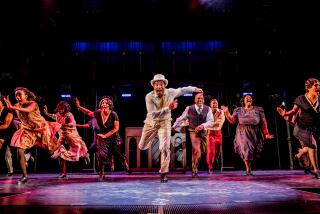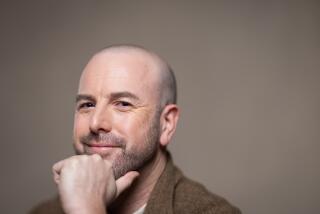George Gershwin, man and music
- Share via
Among the many highlights of Hershey Felder’s “George Gershwin Alone,” a one-man show about the composer’s life that opened Wednesday at the Geffen Playhouse, two in particular stood out.
In the first, Felder stepped toward the front of the stage with a manuscript in his hands, opened it and said simply that this was the original score for “Porgy and Bess.” OK, it may not be Holy Writ, but for some of us, it was a breath-stopping moment to view the source of such priceless music. Having it in his hands also signaled that Felder’s show was sanctioned by the Gershwin heirs. Dare to criticize.
The second took place when the Canadian actor -- starkly lighted by Michael T. Gilliam, so his face became a death mask -- repeated Henry Ford’s anti-Semitic attack on Gershwin and jazz, published in the automobile magnate’s own newspaper but fully suitable for any official Nazi publication. So this was some of what Gershwin faced.
Otherwise, this audience-pleasing, touching memoir surged through Gershwin’s brief life, lingering at important points. (He died of a brain tumor in 1937 at age 38.) The beginnings were energetic and fast-paced, with Al Jolson hearing “Swanee” and making it a hit. Gershwin was 21. Then the hits just kept coming -- “I’ve Got Rhythm,” “But Not for Me,” “Embraceable You,” “Someone to Watch Over Me,” “They Can’t Take That Away From Me.” And so on.
Felder shed light onto the construction of some of them, showing how Gershwin avoided obvious choices to make the music more memorable.
He also tossed off a series of well-timed one-liners, the butts being Gershwin’s mother and father, Jolson, Ethel Merman or even the composer himself. Whether Gershwin was actually such a witty raconteur, someone else will have to say.
Unfortunately, Felder’s script didn’t probe deeply into Gershwin’s inner life. The composer’s relationship with Kay Swift, the woman he loved and lost for lack of commitment to her, is told but not examined.
Gershwin always had problems with critics when it came to his more serious works.
Certainly, it was saddening to hear the reviews that trashed the original production of “Porgy and Bess.” But perhaps we should resist the temptation to consider ourselves so much more enlightened. It hasn’t been that long that “Porgy” has become an opera staple, and some people still question its status.
Vocally, Felder’s light, lyric tenor worked best in intimate singing but turned brassy at louder volume -- intentionally so in the Jolson parody but probably not elsewhere.
Similarly, Felder, a Steinway Concert Artist, played in quieter moments with a velvety touch that grew a bit harsh as volume increased. His climactic performance of “Rhapsody in Blue” was impressive technically but interpretively undistinguished.
“George Gershwin Alone,” directed by Joel Zwick (“My Big Fat Greek Wedding”), premiered in 1999 at the now defunct Tiffany Theater in West Hollywood. Felder now says he regards that initial run as a workshop production, according to a Geffen spokeswoman. The show moved to Broadway for a three-month run in 2001.
The new version includes different anecdotes and music, including “Rhapsody in Blue,” and a set redesign by Yael Pardess. It also runs about 40 minutes longer, largely because of a “singalong” at the end, in which Felder takes requests from the audience and encourages everyone to sing.
It took little prompting Wednesday. The pleasant surprise was hearing how many good voices were out there and how many people knew the songs and lyrics by heart. Who could ask for anything more?
--
‘George Gershwin Alone’
Where: Geffen Playhouse, 10886 Le Conte Ave., Westwood
When: 7:30 p.m. Tuesdays through Thursdays, 8 p.m. Fridays, 4 and 8:30 p.m. Saturdays, 2 and 7 p.m. Sundays
Ends: July 22
Price: $35 to $69
Contact: (310) 208-5454, www.geffenplayhouse.com
Running time: 1 hour, 45 minutes
More to Read
The biggest entertainment stories
Get our big stories about Hollywood, film, television, music, arts, culture and more right in your inbox as soon as they publish.
You may occasionally receive promotional content from the Los Angeles Times.










